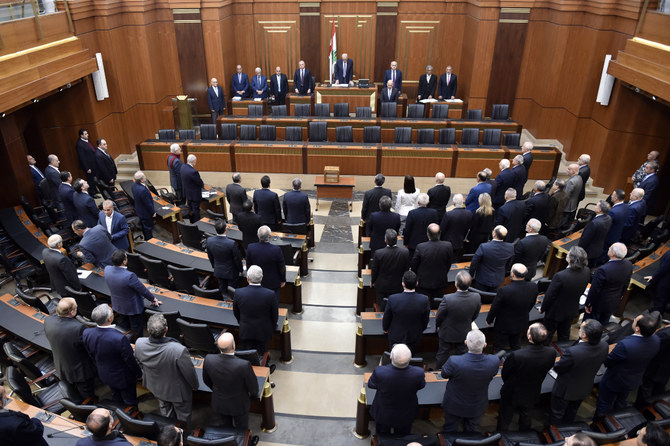
- ARAB NEWS
- 01 Aug 2025

BEIRUT: Lebanon’s parliament failed to elect a president on Wednesday at its 12th attempt, with neither Hezbollah-backed candidate Suleiman Frangieh nor former finance minister Jihad Azour securing enough votes to win the first round of voting.
The failed vote will deepen sectarian tensions in Lebanon, already mired in one of the world’s worst economic crises and facing unprecedented political paralysis with its cabinet only partially empowered and its legislature fractured.
Wednesday’s parliamentary session ended after lawmakers from Hezbollah and allied party Amal walked out following the first round of voting, denying the chamber the quorum it needed to continue into a second round.
Lebanon has been without a head of state for more than seven months, and the last bid to elect a president was held on January 19.
The vote for the presidency, reserved for a Maronite Christian under Lebanon’s delicate sectarian power-sharing system, pits Frangieh against Azour, who has mainly been endorsed by Christian and independent legislators.
With no side appearing to have the numbers to get their candidate across the line, analysts say the vote could further entrench a political stalemate, dimming hopes of saving the economy after three years of meltdown.
Lebanon is facing a double power vacuum, with the country governed by a caretaker cabinet with limited powers for more than a year.
By convention, the premiership is reserved for a Sunni Muslim and the post of parliament speaker goes to a Shiite Muslim.
The international community has urged politicians to elect a consensus presidential candidate who can help the country enact reforms required to unlock billions of dollars in loans from abroad.
Frangieh, a former lawmaker and minister who is a friend of Syrian President Bashar Assad, hails from a storied family dynasty, like many of Lebanon’s prominent political figures.
On Sunday, he promised to be “the president of all Lebanese” despite his polarizing alliances.
Azour was finance minister from 2005 to 2008 and has stepped aside from his role as the director of the Middle East and Central Asia department at the International Monetary Fund in view of the presidential contest.
The winner needs two-thirds majority, or 86 votes from the 128 members of parliament — but Hezbollah and its allies have posted spoilt ballots to disrupt previous votes.
Quorum has been lost before a second round of voting — where the winner only requires 65 ballots — has been able to go ahead.
Hezbollah and its allies adopted a similar tactic in the last presidential vote, a move that left Lebanon without a president for more than two years, until Michel Aoun’s 2016 win.
If Azour gets more than 60 votes it would be a huge “reversal of fortune for Hezbollah,” said Bitar, and would represent massive cross-sectarian “opposition to Hezbollah hegemony on the Lebanese political landscape.”
“However, at this stage, the most likely scenario is a prolonged vacuum,” Bitar added.
Azour on Monday said he wanted to “contribute to a solution” not a crisis, as he announced his bid for the post.
He said he was “not defying anyone,” after Hezbollah described him as the “defiance and confrontation candidate.”
Mohammed Raad, the head of Hezbollah’s parliamentary bloc, has accused Azour’s supporters of not wanting him to be elected but “using him” to block Frangieh’s path to the presidency.
Bitar said a stalemate at Wednesday’s ballot could pave the way for protracted negotiations “that would ultimately reach a third-man solution.”
The United States and France on Tuesday renewed calls for Lebanese lawmakers to cooperate and elect a new president.
French foreign ministry spokeswoman Anne-Claire Legendre urged MPs to “take this date seriously” and “not to waste another opportunity.”